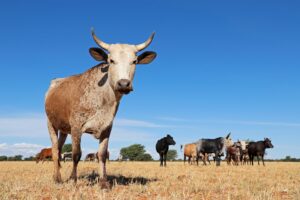Tackling the Desertification Issue at the Political Level
Desertification, exemplified by the haunting image of sand drifting over the remnants of once-thriving civilizations in periodically arid landscapes, now emerges as a formidable peril to the stability of our global society.

Desertification results from the loss of most plant species that provide soil cover. Rainfall runs off the land, leading to floods and leaving behind unproductive, arid areas with blowing sand.
This phenomenon is recurrently documented in historical annals, from ancient depictions of savanna creatures in rock art to Herodotus’s chronicles detailing the transformation of North Africa from the granary of the Roman Empire into the desert to contemporary scholarly publications.
In the first part of the interview with Allan Savory, we discussed the ancient problem of desertification and its tie to livestock and climate change.
He pointed out the dangers threatening humanity of current thinking and ill-informed media focus.
Historical beliefs regarding overgrazing, objections related to animal treatment in agriculture, and methane emissions from cattle complicate this issue.
However, overgrazing, attributed to excessive animal numbers, is a belief first invalidated as such by the French scientist Andre Voisin. Also, excluding animals from land management disrupts ecosystem functioning in seasonal rainfall, although not in humid environments, and increases the risk of desertification and megafires.
The holistic planned grazing process has long been demonstrated as an effective solution to reverse desertification by using livestock and producing increased food.

Yet, despite its demonstrated effectiveness in combating desertification, the persistent reluctance among various stakeholders to embrace holistic management raises a pertinent question: is the challenge of desertification fundamentally rooted in political dynamics?
In this interview with Captain Forest, Allan Savory emphasized the importance of addressing the root cause to solve any problem. Let’s explore the potential solutions and hopes this approach might offer.
Q: Can you explain the complex conflict between environmental conservation and food and livestock production?
The undeniable conflict between environmental conservation, food production, and livestock vilification is greatly magnified today, in the same way we would explain why humans could not fly for thousands of years.
We did not fly because we did not know how to do so until the Wright Brothers demonstrated the principles of flight. Then, human creativity was unleashed, and within 70 years, we were in space. The human spirit flew.

For over 10,000 years, as civilizations disappeared under desert sands, we wrongly blamed overgrazing by too many sheep. Over the last decades, we have increasingly blamed climate change on greenhouse gases from livestock and fossil fuels.
Consequently, people are demanding world leaders act accordingly.
Yet, annual climate conferences attended by the world’s experts conclude in disarray without clear guidance for policymakers. The prevailing narrative blames livestock but conflicting arguments abound.
Alarmingly, governments and corporations are funneling billions into geoengineering—technological interventions to manipulate atmospheric composition.
At COP26, I underscored a glaring but overlooked reality: there is now a near-universal consensus among scientists that human activities are the primary drivers of climate change.
This acknowledgment has profound implications for our collective future. If we accept that humans are responsible for climate change, it becomes clear that our management practices—how we handle livestock and other resources—cause global biodiversity loss, desertification, and climate change, not the resources themselves.
Therefore, the focus should be on improving our management practices to address the root causes of climate change.
At a global scale, management means management through our governments’ agricultural and energy policies dictating, as they do, the production of food and energy, corporate behavior, and monopolies through taxation, banking regulation, laws, and more.
Q: How do you view the proposed solution of reducing animal husbandry and meat consumption to address environmental and ethical concerns, given the issues of greenhouse gas emissions and animal abuse in intensive farming?
While this proposal is well-intentioned, regrettably, it falls short of providing a viable solution. The corporate-driven factory model of meat production not only inflicts cruelty but also damages the economy, the environment, and human health.
Such detrimental management practices in food production directly result from how governments (political parties) develop policies in all areas, precisely agricultural policy.
This issue is not confined to Europe alone; it permeates every government, because regardless of the government, all develop policies in the same way.
Consequently, agriculture has emerged as the most destructive industry globally.
During COP26, I emphasized that management is the root cause of climate change. I highlighted that while we produce or make millions of things—smartphones and books to bombs, or milk, meat, wine, and corn—we do not manage them effectively.
None of these items are self-organizing; their production halts if not actively sustained, be it due to a malfunctioning part, depleted fuel, or a drained battery.
Hence, it is crucial to acknowledge that human management encompasses three critical aspects: our lives (families), institutions and the financial resources supporting them (economies), and the environment (nature), which sustains all life and economic activity and from which we produce everything making civilization possible.
Families/cultures/institutions, economies, and nature are managed, not produced.
They are complex, self-organizing, and inseparable. Governments worldwide, ranging from single-party dictatorships to multi-party democracies, overlook this fact when formulating policies that dictate management at a large scale.
Governments typically consult experts in food or energy production, who inevitably lack expertise in the indivisible management of institutions, economies, and nature or our life-supporting environment.
Consequently, policies often result in unintended consequences, as exemplified by agriculture, the most destructive industry worldwide.

Political leaders need to address the root cause of the problem, which is not aided by endless public debates and conferences that vilify farmers or their livestock.
Q: On the political front, there’s a claim that reducing greenhouse gas emissions requires fewer animals. Is this assertion accurate?
Biodiversity loss: a root cause of desertification and megafires
 This perspective—reducing GHG emissions requires fewer animals—appears correct only when viewed through an exceedingly narrow, ecologically illiterate lens, rendering it dangerous and detrimental to future generations.
This perspective—reducing GHG emissions requires fewer animals—appears correct only when viewed through an exceedingly narrow, ecologically illiterate lens, rendering it dangerous and detrimental to future generations.
Any ecologist understands that the cycle of global desertification and megafires driving climate change cannot be disrupted solely at the atmospheric or biosphere level; instead, it must be addressed at the root cause—biodiversity loss, where environmental destruction originates.
During an Oxford debate in 2023 with a writer from the Guardian, I posed a critical question:
“Let’s assume that the world’s soils could absorb no carbon, that cattle emitted twenty times more methane than they do, and that humans ceased consuming meat altogether, leading to the natural demise of all animals due to starvation, disease, or predation. Given these hypothetical scenarios, what advice would scientists offer to those in power to reverse biodiversity loss and desertification fueling climate change?”
The stark reality is that such a task would be impossible without significantly increasing the number of animals grazing on the land rather than being confined to corporate factory farms.
Humidity distribution and microbial biological decay
A fundamental aspect often overlooked, particularly in Europe and many parts of the world is the distinction between rainfall patterns in different regions.
While London and Johannesburg receive comparable rainfall amounts, their environments differ significantly.
In the UK and much of Europe, rainfall is spread over numerous months, facilitating the rapid decay of vegetation and sustaining life in the soil whether there are many or no large herbivores.
Conversely, regions like Johannesburg experience erratic rainfall patterns, with long dry periods exacerbating decay challenges.
Without sufficient humidity to support rapid microbial biological decay, plant material undergoes chemical oxidation in sunlight, contributing to desertification if there are too few or no large herbivores or their behavior is altered without predation.
Despite the opinions of numerous Nobel Laureates and esteemed universities worldwide, no amount of fire or technological innovation could cycle billions of tons of annually dying vegetation, which, if it does not cycle, results in desertification and climate change.
Similarly, spending billions of dollars on technological geoengineering of the climate will not suffice to achieve the necessary results.
Reversing desertification in regions with erratic and especially low humidity
For countless eons, the biological decay in such regions mainly took place in the moist stomachs of large grazing and browsing animals.

To reverse desertification and safeguard civilization, we must embrace and develop the holistic planned grazing process necessitating the presence of millions more cattle, sheep, goats, camels, horses, and wild herbivores on the land.
The unavoidable truth is that we must address the root cause of climate change, which necessitates global cooperation and concerted efforts by world leaders to reform the way in which policies in agriculture and energy are developed.
Central to this endeavor is addressing the unwarranted vilification of livestock on the land, prioritizing sustainable practices over the corporate-driven factory farming model.
Q: Is there a link between political ideology and the mainstream responses to the environmental crisis—such as vilifying livestock?
Yes, unfortunately, this issue is highly prevalent in the United States and spreading globally. It has evolved beyond a mere political difference to intertwine with wealth distribution.
This trend is most noticeable in the United States, with Europe mirroring America’s agricultural trajectory. Here, we witness the fusion of dietary preferences with political ideologies.
Those hailing from rural areas, still connected to nature, tend to consume meat and are often associated with conservative viewpoints.
Conversely, individuals residing in urban settings, largely disconnected from nature, are more inclined towards meat-free diets and are perceived as liberal.
Even more striking is the wealth disparity, wherein affluent individuals can afford a diet rich in animal protein. At the same time, the less privileged are relegated to consuming low-nutrient foods manufactured, packaged, and marketed by major corporations.
These corporations wield significant influence, funding universities, lobbying, and leading political campaigns to prioritize profit over human health and well-being.
The repercussions are dire, with an estimated 300,000 deaths annually in America attributed to obesity-related illnesses, a toll surpassing three times the annual casualties of World War II.
Q: Is it possible to produce meat and dairy products for 8 billion people while observing the ethical treatment of animals, and if so, what are the solutions?
The Imperative of Policy Reform in Addressing Global Challenges
Indeed, achieving a solution is entirely possible. Still, there are no quick fixes or silver bullets—only a collective effort among nations and those in power to address the issue with unity and harmony.
First and foremost, we must recognize the imperative to address how governments—whether from single-party dictatorships to multi-party democracies—develop policies, as this lies at the heart of the problem.
As we’ve discussed, scientists now universally acknowledge that mismanagement is the root cause of biodiversity loss, desertification, and climate change.
Yet, despite this consensus, the media, universities, environmental organizations, influential figures, and much of society persist in blaming everything but management dictated at large scale through policy.
The Impact of Mismanagement and the Path to Sustainable Solutions
To illustrate unequivocally that policy-level mismanagement is the heart of the issue, consider the state of National Parks.
Those in marine and humid land areas worldwide thrive, with biodiversity intact and generally increasing.
However, National Parks across vast expanses of Earth’s land—such as those near my home in Botswana, Zambia, Namibia, Zimbabwe, and in the American states of New Mexico, Arizona, and Utah—offer appalling examples of biodiversity loss and desertification fueling climate change. Why are renowned non-profit organizations not addressing this?
These national parks are already “re-wilded,” and we cannot blame any of the things we hear scientists, environmentalists, media, and society blame, such as poaching, cattle, goats, sheep, atmospheric gases, methane, fossil fuels, corruption, politics, corporate profit and greed, colonialism, racism, excess population, or climate change.
The singular factor responsible in every case is how governments, environmental organizations, and all institutions develop policy.
By addressing this fundamental aspect, we can reverse biodiversity loss and ensure food security for over 8 billion people while regenerating our life-supporting environment.
Without changing the universal way in which all policies are developed, no business, university, political party, economy, town, or city will be sustainable.
This is not a scientific problem requiring more research, funding, and endless academic conferences. It is purely a management issue, as I first recognized and studied it as a young ecologist in Africa in the 1950s, nearly seventy years ago.
Q: To conclude, what advice would you give to political leaders to mitigate the environmental crisis, specifically desertification?
Understanding the Dilemma of Political Leadership
As a former president of a political party myself, I intimately understand the dilemma confronting all politicians in power—grappling with complex issues for which there are no easy solutions.
Presidents, prime ministers, and dictators rely on a cadre of knowledgeable advisors spanning various fields of agricultural production, research, and practice within their nations.
These advisors help shape policies governing culture, institutions, economy, and the life-supporting environment, including food production.
However, despite their expertise in all aspects of food production, few nations possess individuals skilled in developing policies that address the simultaneous and indivisible management of institutions, economy, and nature—the essence of sustaining civilization.
I am unaware of any nation in which leaders have experts to facilitate the development of policies that integrate these crucial aspects.
The Importance of a Pragmatic Approach to Policy Development
While it may be impractical to outline a comprehensive solution in a brief interview, if asked what advice I would offer any political leader, I would echo the sentiments I expressed during a 12-minute talk at COP26.
Essentially, I would advocate for a pragmatic approach that balances the need for political expediency with the imperative of addressing global climate challenges at the root cause – how policy is developed.
No political party leader can afford to take risks, given the imperative to grow their party, secure its financing, and garner votes. Therefore, if I were in such a position again, I would continue to govern in alignment with the expectations of those who elected me, even if it means perpetuating practices that harm the country and jeopardize humanity’s future. That is political reality.
However, I would also transcend partisan politics to adopt a statesmanlike stance. I would publicly acknowledge the urgency of global biodiversity loss, desertification, and climate change, recognizing that no nation can now stand alone in addressing these challenges.
Developing a National Holistic Context for Sustainable Policies
Then, I would commit to convening citizens to formulate an agricultural policy in the nation’s interest above any institutional vested interests.
This policy would be based on what is called a national holistic context, tying how every citizen wants their life to be to their life-supporting environment.
It would ensure food production by managing the full complexity of our culture, institutions, economy, and life-supporting environment or human habitat. Policy so developed could then be considered for adoption by the nation.
Because this approach is so new, a national holistic context roughly outlines what citizens desire for their lives and how it aligns with environmental sustainability. It would become the guiding principle for all policy actions.
We want stable families living peaceful lives in prosperity and physical security, free to pursue our own spiritual or religious beliefs. We want access to nutritious food, clean water, and good education and healthcare in balanced lives with time for family, friends, community, and leisure for cultural and other pursuits.
The downside of such publicly observed policy development in a new way, if it failed to produce harmony and unity and a sound policy apparent to all, would be a wasted year and a few million dollars. The upside, however, cannot be measured in terms of billions of lives and trillions of dollars saved. It would begin a domino effect globally because no political leader today knows what to do.
By developing policy in a national holistic context and addressing the root cause of biodiversity loss, desertification, and climate change in a manner that all citizens can relate to, the human spirit can and will thrive.
A Vision for Sustainable and Inclusive Policy Development
United, we can offer future generations hope. By fostering inclusive dialogue and cooperation, we can devise policies that resonate with all sectors of society and pave the way for a more sustainable future.
The missing element among our leaders is not willpower or knowledge but rather a constructive path forward that fosters unity and mitigates the blame, anger, and conflict escalating worldwide.
States would need assistance to facilitate the implementation of such policies, a role that the Savory Institute stands ready to fulfill for any world leader demonstrating such statesmanship.
Did you like this article? Please leave us a comment below👇.



